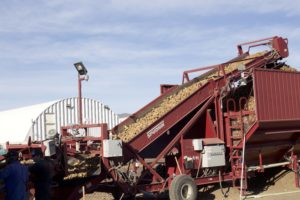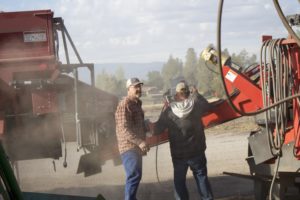Oct 2, 2018Spudman Sneak Peak: First look at state seed acreages
Reports from across the country are that yields for the 2018 harvest are good, including for seed producers. Striech and Associates, outside of Kalispell, Montana, showed both good quality and yields as their harvest got underway last month. Stoddard Farms, near Grace, Idaho, reported one day before the end of harvest they were bulging at the seams when it came to storage capacity.
Spudman will have a full report of the seed acreages and varieties from across potato producing states in the Nov./Dec. seed issue. Until then, here’s a look at the reports from two of the 11 states that we include in our full coverage.
 2018 Oregon seed potato certification report
2018 Oregon seed potato certification report
In 2018, 2,842 acres of seed potatoes were accepted for certification by the Oregon Seed Certification Service (OSCS). This was about average, but a decrease from the 3,181 acres in 2017. Most of the reduction was due to a decrease in acres certified for organic production in Northeast Oregon, and a reduction of seed acres produced in Central Oregon with the retirement of one of our long time producers, Jim Carlson.
All acres entered for certification this year were accepted for certification (as per the field inspections) with the exception of a single lot of a proprietary variety that was not approved for certified production by the variety owner. Summer field readings for disease were low. No lots were downgraded or rejected. Blackleg and white mold levels were considerably lower than previous years. Heavy smoke continued to blanket much of our growing areas again this year but did not seem to affect yields or quality of the tubers. Some fields are producing record yields.
The number one variety produced in Oregon this year was Gala with 462 acres, followed by an assortment of Frito-Lay varieties at 327 acres. Russeted white fleshed varieties for processing or fresh market made up the bulk of the rest of Oregon production in 2018. However, specialty red and yellow flesh varieties continue to gain a foothold. A complete listing of the varieties and acres produced in Oregon can be found on our website at http://seedcert.oregonstate.edu/potatoes under “Seed Report and Directory of Growers” and “Oregon Certified Seed Potato Field Readings and Statistics.”
 At the time of this writing, harvest is underway. OSCS has had difficulty filling the local part-time seasonal positions of harvest inspectors. They inspect tubers in the fields during harvest, principally looking for nematodes, bacterial ring rot and evidence of internal necrosing viruses. OSCS will have to resort to more tuber bin inspections and closer physical inspections of the tubers submitted to the winter grow-out this year.
At the time of this writing, harvest is underway. OSCS has had difficulty filling the local part-time seasonal positions of harvest inspectors. They inspect tubers in the fields during harvest, principally looking for nematodes, bacterial ring rot and evidence of internal necrosing viruses. OSCS will have to resort to more tuber bin inspections and closer physical inspections of the tubers submitted to the winter grow-out this year.
On a final note, OSCS has hired a new manager this year, Andrew Altishin. He comes with very good management skills and is rapidly gaining the knowledge needed to administer a program with such a diverse array of crops. In 2018 Oregon certified over 130 different crop types including 1,275 varieties with certified production.
– Jeff McMorran, Oregon Seed Certification Service
2018 Maine seed potato certification report
The 2018 growing season was very similar to what growers experienced in 2017 with a cool spring and prolonged dry spells for the rest of the growing season in Aroostook County. Southern and Central Maine experienced dry periods also. Luckily certain growing areas received rain later in the season to help sustain the crop.
Overall, the 2018 crop appears to be very healthy despite dryness in some areas. As of September 14, 2018, the certification program has 9,333 acres field certified from 109 farms.
The top five varieties entered for 2018 are:
- Atlantic 843 acres
- Lamoka 685 acres
- Snowden 627 acres
- Russet Burbank (MT strain) 594 acres
- Russet Burbank (ID strain) 508 acres
Inspectors are now performing PCN sampling and are in preparation for laboratory PVY postharvest testing. This year marks three years of transition in postharvest laboratory testing for the department. For 2018 the Florida grow-out has been fully phased out and all samples will be ELISA postharvest tested at the certification laboratory in Presque Isle.
– Ron Dyer, director of the Bureau of Agriculture, Food and Rural Resources for Maine’s Department of Agriculture, Conservation and Forestry (DACF), and Walter Whitcomb, commissioner of DACF.







